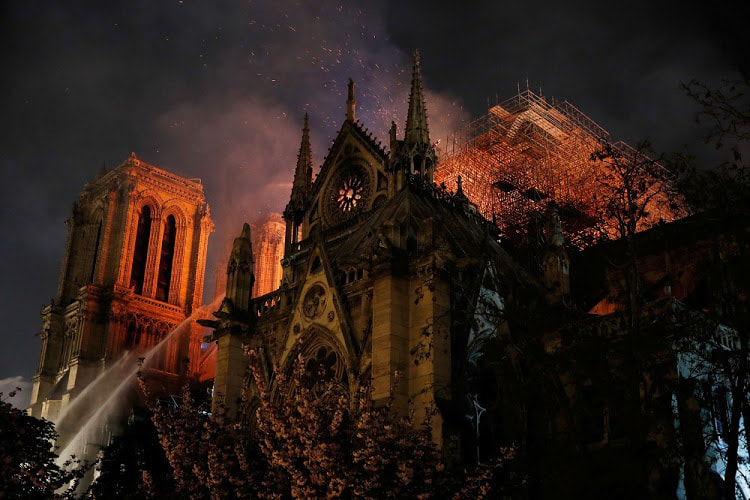|
While Notre Dame was burning on Monday, several American commentators referred to the book, and subsequent movie, “Is Paris Burning?” – about the German general who allegedly disobeyed Hitler’s orders to level the city during the retreat of 1944. The cathedral is a geographical center for France, and the beating heart of Paris to all of us who visit and love it -- or even have the privilege of living there for a month here and there. We took our three children to Paris in April of 1975, almost immediately visiting Notre Dame, where our youngest fell in love with the gargoyles who still broodingly guarded over the city, even as flames raged on Monday. On that family trip, three decades after the War, we talked about World War Two, grateful that this beautiful city, this beautiful cathedral, had survived. On Monday, les pompiers, the firefighters, controlled the blaze. Paris was burning. Of course, people thought about the book and the movie. However, when I went to the Web, I realized there is considerable historical debate about whether General Dietrich von Choltitz overtly acted to save Paris or merely dragged his feet, while saving his own life and shoring up one tattered corner of his reputation. Did the general really say no? "If he saved only Notre Dame, that would be enough reason for the French to be grateful," the general's son, Timo, told a British newspaper in 2004. "But he could have done a lot more.” The general’s alleged act of refusal and respect for a glorious city – perhaps self-aggrandizement -- comes up sometimes when conscience is the subject. From my American perspective, I immediately linked the survival of Paris, the endurance of the cathedral on the Île de la Cité, with overt acts of terror and torture perpetrated by Donald Trump on the border with Mexico. Who says no? Who follows the law? Who cares for fellow humans? The legend of a general who participated in the Holocaust, is back in the ozone, revived by the horrible fire. We want to be grateful to a German general who may have said “No,” but there are so many questions. He said he acted out of military prudence, as a trained general, who surely considered himself above the unskilled, ignorant, raving “leader.” Germany of the ‘30s never had enough leaders who could say “no.” Does any nation have enough people in positions of power, responsibility, who can muster the inner strength to say no? This is a very current debate for those Americans who now consider the military – the tradition of service, adherence to law – as one of the last strengths of the nation. Who will say no? I am reminded of this every time I see videos of one of Trump’s people, Kirstjen Nielsen, sighing patronizingly when questioned by (Democratic) representatives about putting children in cages. Soon afterward she was pushed out by Trump for not doing enough to separate and harm (torture, if you will) les misérables on our borders. The urge to survive, by Gen. von Choltitz might have helped save Paris in 1944. Is inaction enough when evil orders are given? Who will say no? * * * https://en.wikipedia.org/wiki/Dietrich_von_Choltitz https://www.thelocal.fr/20140825/nazi-general-didnt-save-paris-expert https://timesmachine.nytimes.com/timesmachine/1966/11/06/83551081.pdf
Madeleine Schreiber
4/16/2019 10:39:48 am
That is what I wonder every day - when will the Republicans realize that Trump is a danger to our democracy and stop supporting his every action.
George Vecsey
4/16/2019 11:20:35 am
Hi. Strange to see a cathedral burning and doing segue to my own country....but the answer is, Not Soon Enough, not with Supine Senators like McConnell and Graham. Nice to see your name in the queue. GV
bruce
4/16/2019 11:27:27 am
madeleine,
bruce
4/16/2019 10:43:02 am
george,
George Vecsey
4/16/2019 11:22:55 am
wow.....lot of good times in all those visits. plus a fire.....
bruce
4/16/2019 11:32:32 am
george,
Hansen Alexander
4/17/2019 12:03:12 pm
A beautiful piece of writing and an outstanding analogy, George.
Ed Martin
4/17/2019 04:04:24 pm
Thanks for the article and the context. Just yesterday trumpery vetoed a bi-partisan bill that limited US bombing in Yemen and I thought, there was a time when Republicans would overturn a veto of legislation they had passed, partly in principle, partly in affirmation of their Constitutional role. I doubt they will, today. McConnell would probably not even allow it to be considered. Comments are closed.
|
Categories
All
|










